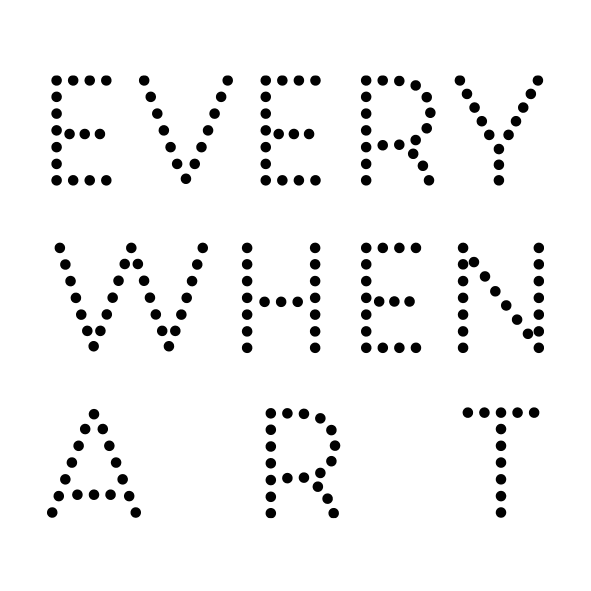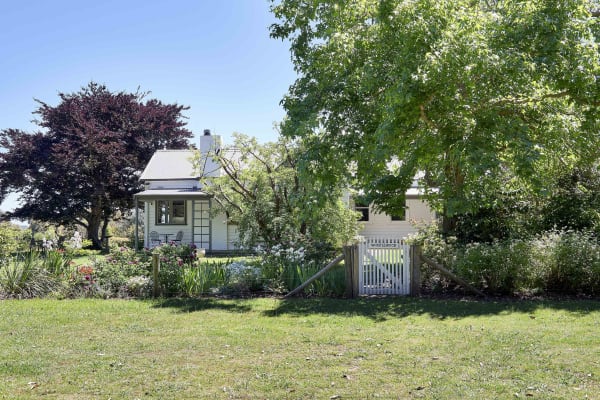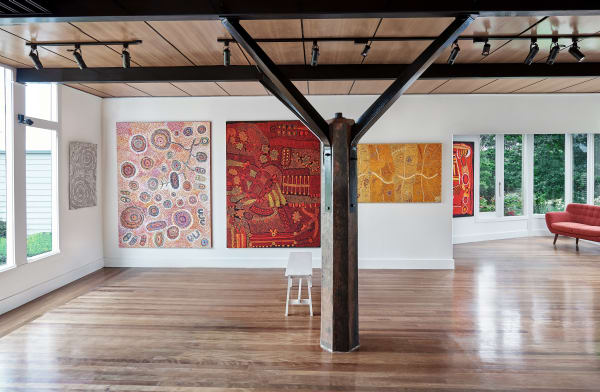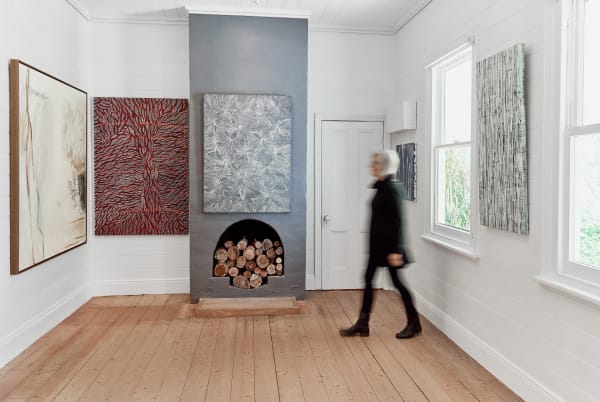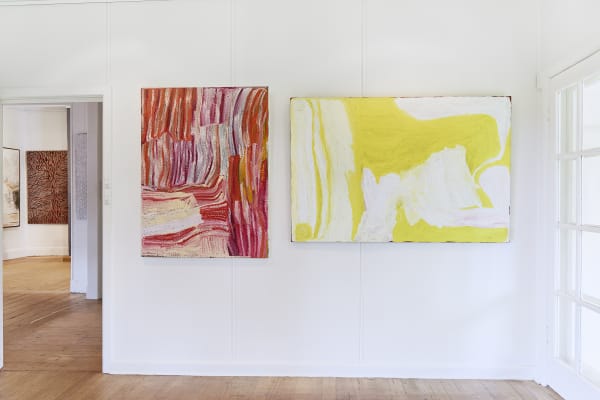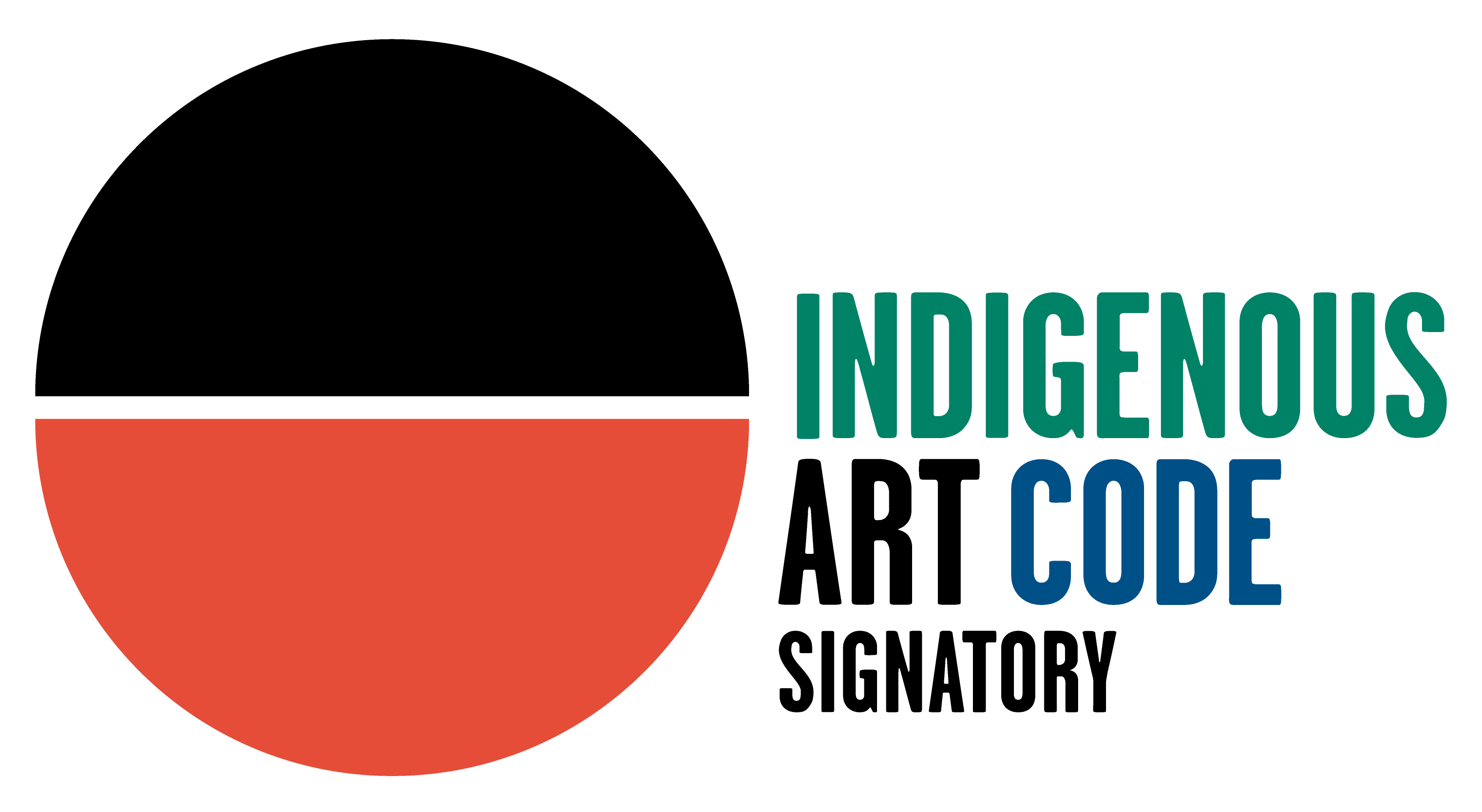Everywhen Art is located in the historic house gallery Whistlewood in the Mornington Peninsula's beautiful hinterland on Bunurong Country. Here you can find a wide range of fine quality Aboriginal art and select works by Australian artists, curated by art specialists Susan McCulloch OAM and Emily McCulloch Childs. The dynamic exhibition programme features paintings, sculptures, ceramics and other mediums from more than 40 Aboriginal-owned NFP art centres around Australia. Other events include talks, occasional film screenings, book launches, music and film events, artist-led workshops and the McCulloch's unique Art Parades.
Home of the art critic, author and founder of Mornington Peninsula Regional Gallery, Alan McCulloch A0 and actress and writer Ellen McCulloch (Ella Bromley) from 1951 to the early 1990s, Whistlewood has been owned by 3 three generations of the McCulloch family of art writers and curators for more than 70 years. The cottage, built by the early settler Tuck family in the 1870s and the architect Charles Smart in the 1930s and 40s, since the 1950s Whistlewood has hosted many arts luminaries. These have included Arthur Boyd, John Brack, Albert Tucker, John Perceval, Clement Greenberg and many others. Set across 5 ha of regenerated bushland and gardens, the rooms of the renovated cottage and the art it displays unfold with its architecture and history.
In 2023 Whistlewood was nominated for a local heritage listing by the Mornington Peninsula Shire. See the heritage listing here
Join our mailing list for news of exhibitions and other events.
-
Historic Whistlewood
Whistlewood is located on the traditional lands of the Bunurong /Boonwurrung people of the Kulin Nation, who have lived in this area for over 40,000 years. They had a great respect for the land and the entire ecosystem. Bunurong people still live on the Mornington Peninsula, looking after the land and their families. Today, Aboriginal and Torres Strait Islander people from all over Australia live within the Mornington Peninsula shire boundaries. Everywhen Art has worked extensively with Indigenous artists of the Peninsula and Victoria, from many different language groups.
Whistlewood at 642 Tucks Road, Shoreham was built in the 1870s by Samuel and Margaret Tuck. Samuel was of the sons of the early Scottish settler Henry Tuck. Whistlewood has been owned by three families since it was first built, these being:
• Two generations of the Tuck family from the 1870s to the late 1920s• Architect Charles Pyne Smart and family from the late 1920s to 1951
• Three generations of the McCulloch family from 1951 to the present day
In the 1920s the original house, as seen in a photograph, was a 5 room weatherboard cottage comprising front porch, front parlour, two bedrooms, kitchen, back porch/laundry. It has been modified and extended over the years by owner/architect Charles Smart (of the firm later to become Bates Smart) and the McCulloch family. The front 1870s exterior remains as does Charles Smart's two extensions. Internally while some of the walls have been partially removed, the original pine floor boards, wall panelling and room layout remain as when they were built.
Artistic significance
Alan McCulloch AO (1907-1992) was founding director of the Mornington Peninsula Regional Gallery, founding author of the Encyclopedia of Australian Art and a number of other seminal books on Australian art as well as travelogues. An influential art critic for more than 60 years, notably for The Herald for 30 years, he was described by one obituarist as ‘arguably the most influential art critic of the last half of the 20th Century’. Alan McCulloch received an Order of Australia (AO) and an honorary Doctorate of Laws. Ellen McCulloch (1908-1991) was an Australian-born actress and businesswoman who starred in one of Australia’s first talking films in the 1930s before leaving for the US where she lived for 16 years, becoming a US citizen and manager for Elizabeth Arden. In 2019 the Mornington Peninsula Magazine profiled her life. In 1948 Ellen and Alan married in NYC, having travelled across America in an event-filled trip related in Alan McCulloch’s subsequent book Highway Forty. After living in New York for some time, the couple then went to Paris and undertook an equally epic tandem bicycle journey from Paris to Positano, (related in the 1950s book Trial by Tandem) where they lived for a year before going to London where Susan McCulloch was born, then returning to Melbourne and thence to Whistlewood in 1951 – their family home for 40 years and which had become something of a mecca for their many artist and other creative friends. They died within 18 months of each other in 1991 and 1992.
McCulloch/Boyd Studio
In 1951 Arthur Boyd and Alan designed and built Alan’s studio adjacent to the house. This 6 x 7 metre wooden building with its southern and rural views remains a working studio today, along with many books, artworks, memorabilia and other items of artistic interest. Alan McCulloch’s archive of more than 6000 letters, manuscripts and other material that spanned more than 60 years of Australian art was formerly housed in the studio. In the 2000s this archive was acquired by the State Library of Victoria where it forms one of their most significant visual arts archives and was the basis of Rodney James' book Letters to a Critic: Alan McCulloch's World of Art" (Miegunyah/MUP, 2023) .
Alan McCulloch and Arthur Boyd however had been earlier frequent visitors to the Peninsula, when in the 1930s they, with Alan’s brother, the artist Wilfred McCulloch (1910-1942) and others established an artists’ camp at Gunnamatta where they drew, wrote, swam and surfed the wild, and then very little visited coast. Today the McCulloch family own many of Wilfred’s post-impressionistic oils, watercolours and sketches of that era, housed at Whistlewood and which form an important archive of records and views of the Peninsula in the 1930s.
Alan McCulloch c.1934
-
Artistic Visitors
Since the McCullochs ownership of Whistlewood in 1951, the house and its 5 hectares of lands have attracted hundreds of artists, writers, academics, actors, musicians, architects, furniture designers, dancers, directors and many others as visitors or regular guests at Whistlewood. These have included many arists and their families including John Brack, Fred Williams, Arthur Boyd, Charles Blackman, John Perceval, Godfrey Miller, Leonard French, Roger Kemp, Andrew Sibley, Albert Tucker, Russell Drysdale, Louis Kahan, Harald Vike, Guy Grey Smith, Dorothy Braund, Guelda Pyke, William Frater, Graham and Inge King, Noel Counihan, Martin King, Gillian Haig, Michael Fitzjames, Ann Heather White, Ken Smith, the Peninsula Plein Air painters and many others. In 1968 L Scott Pendelbury won the prestigious Wynne Prize for Landscape at the Art Gallery of New South Wales for his painting “Road to Whistlewood”.
International arts visitors have included the New York City Ballet (who held a large barbecue on its grounds), the NY critic Clement Greenberg, painter Friedrich Hundertwasser, the cellist Mistislav Rostropovich, Susan McCulloch’s godfather the lyricist, Oscar Hammerstein II and his Australian-born wife Dorothy Blanchard, and many others. Barry Humphries was a regular visitor as have been numerous other actors, dancers, musicians, film directors and theatre personnel and a wide range of writers, publishers, academics, architects and others in the creative industries. Since the early 2000s, Whistlewood has also presented and hosted many visits by Aboriginal artists from around Australia as well as Indigenous musicians and poets for exhibitions, performances, film screenings, poetry readings and other events. Whistlewood and its artistic heritage has featured in several exhibitions relating to artists on the Peninsula at the Mornington Peninsula Regional Gallery.
Images of Whistlewood when Alan and Ellen McCulloch lived there were taken by their daughter Susan on her Box Brownie camera. Artists in the photographs include: Arthur Boyd, John Brack, Helen Maudsley, Albert Tucker, Godfrey Miller and John Perceval.
Alan McCulloch outside his studio, photograph Susan McCulloch
-
Whistlewood gallery
Whistlewood has been the business headquarters of the McCulloch family’s publishing, art consultancy and home gallery since the mid 1980s. In 1991, Susan McCulloch OAM and her daughter Emily McCulloch Childs inherited the property and undertook renovations while retaining the existing historical features of the house. They cleared 5 hectares of pine trees and planted more than 2000 indigenous trees , shrubs and grasses.
The gardens and broader environs are key and integral elements of Whistlewood’s most important core activities – to foster, celebrate, explore, display and educate about the art of place, including Aboriginal art, that of nature and the environment. The McCullochs art consultancy grew with the popularity of its exhibitions of Aboriginal art in the 2000s which introduced Aboriginal art from around Australia to the Peninsula and which have attracted thousands of visitors, leading collectors, academics and writers – a number of whom have conducted highly popular talks at Whistlewood.
The present
Today, the activities and spirit of Whistlewood as an art consultancy and home gallery remains as they have for the last 70+ years - a repository for art and a place which freely invites those interested in art, culture and the environment. It remains a hub of working creativity. Susan and Emily McCulloch’s Whistlewood includes exhibiting art of nature, the environment and landscape; engaging with the Indigenous knowledge and people of the region and from across Australia, in education, art, ecology, writing, poetry and conversations, to encourage artists to visit to capture its views; to conduct talks on Australian and Aboriginal art, the history and art of Whistlewood and early Peninsula art; and to continue to enable and promote Whistlewood as a unique Peninsula cultural resource.
In 2022/23, Susan and Emily undertook a major rejuvenation and renovation of the house, gardens and land, which included working with local experts in Indigenous plants and planting many more Indigenous grasses, shrubs and trees. They enlisted local skilled tradespeople to undertake important building works to maintain the house and create a new larger outdoor deck for events, renovate the house to create more functional gallery spaces, add further native, kitchen and flower gardens, rebuild the front garden path, paint the house, and restore brickwork such as the original well.
They relocated their Flinders exhibition space, Everywhen Artspace to become the central focus of Whistlewood, creating EVERYWHEN ART - launched with a grand opening exhibition HOME in January 6 2024. This saw them collaborate again with galleries such as SALT Contemporary, Australian Galleries and Gallery Smith to present a major exhibition of art and artists working on the theme of home, including many who visited Whistlewood over the years.
EVERYWHEN ART continues with a diverse and fascinating exhibition program, exhibiting works from some of Australia's most acclaimed Aboriginal art centres, providing a platform for emerging and developing artists and continuing to showcase some of the finest established artists working now. Exhibitions include events, talks and demonstrations by artists from across Australia, conversations and themes including Indigenous ecology, science, landcare and knowledge systems.
Whistlewood gallery, photograph Alison Hoelzer
